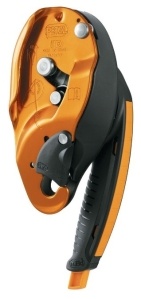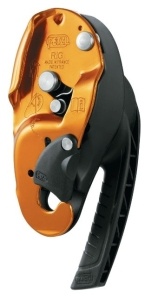Gear Review: Petzl I'D or the Petzl RIG? Which one do you prefer?
Author: Wesley Chadwick
Petzl I'D
Breakdown:
- Standard introductory descender.
- Multi-function handle
- Button on the handle allows for smooth movement on inclined or horizontal terrain.
- Anti-panic function activates if the user pulls too hard on the handle.
- Anti-error catch to reduce the risk of an accident due to incorrect installation of the device on the rope.
- The shape of the cam is designed to improve rope glide when ascending.
- The gate on the moving side plate helps prevent dropping the device.
- Pivoting cam facilitates taking up the slack in the rope.
- The moving side plate locks with a screw, allowing the I’D S to be integrated into rescue kits.
- Able to accommodate technicians weighing 100Kg – 140Kg (inclusive of all gear).
- Lowers heavy loads up to 250 kg, only for expert users (trained personnel).
- Available in yellow and black.
- Min – Max rope diameter: 10 mm -11.5mm.
- Weight: 530 g.
- Descent: 200m max.
- Certification(s): CE EN 341 class A, CE EN 12841 type C, NFPA 1983 Technical Use, EAC.
Personal Opinion
This a great descender! Definitely leaps and bounds from the old Petzl STOP. Having the integrated multi-function handle saves time on having to use the rope to lock the device off when stopping to carry out your work. With the added Anti-Panic function, it stops the technician cranking down on the handle and dropping until their back-up device engages or they come into contact with something that stops them, usually ending the days work abruptly! The Anti- Error function makes it a great device for when a rope has been threaded on the cam backwards! They wont be able to go anywhere as the toothed catch will engage, unlike the STOP which would become a GO! For cons, its bulky. It weighs 150g more and is a good third larger than the Rig. For more experienced users, the anti-panic setting can get in the way; especially on wet ropes.
Petzl Rig
Breakdown:
- Designed for rope access work (expert users only).
- Multi-function handle.
- The automatic return system on the handle limits risks in case of an involuntary action by the user.
- Handle storage position reduces the risk of snagging when the descender is being carried on the harness.
- The gate on the moving side plate helps prevent dropping the device.
- Pivoting cam facilitates taking up the slack in the rope.
- Can also be used to make a progress-capture haul system, and for short ascents.
- Lowers heavy loads up to 200 kg (trained personnel).
- Available in yellow and black.
- Min – Max rope diameter: 10.5 mm -11.5mm.
- Weight: 380 g.
- Descent: 200m max
- Certification(s): CE EN 12841 type C, CE EN 341 class A, NFPA 1983 Technical Use, EAC.
Personal Opinion:
Another great descender and again, a far simpler piece of gear than the traditional STOP. The automatic return function on the handle is a great addition as it just means less chance of catching your handle while you are working and engaging the cam when you least expect it. Also, the storage setting for the handle makes it nice and compact when storing on your harness or even better when its hanging on your harness not being used. However, the metal used on the cam is slightly softer (unless its been addressed recently) than the I’D. Meaning, the cam will wear faster than the I’D’s cam. This can be an expensive replacement if you are doing long fast drops all day. Many techs have jumped at the chance to get one. They are recommended for expert users or experienced techs. Due to the differences in the two devices, it comes down to understanding the gear and being able to use it as it should in a controlled environment. What we don't need is an inexperienced tech cranking down on the handle and decking out to show how easy it actually is to do.
I’d gladly use a Rig over the Petzl ID any day! For safety, I would always recommend an I’D for staffing jobs unless manned with experienced L2’s and L3’s.
Need to purchase more I'D's? Visit our online Equipment shop!

